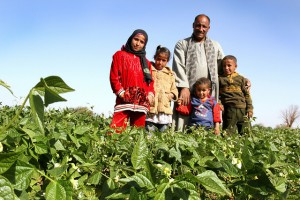Institutional capacity and coordination

Ensuring adequate institutional capacity and efficient coordination is essential for the realization of the right to social security. Without adequate capacities and resources, it is impossible for any public administration to respect the principles of a rights-based approach. This includes well-trained staff, transparent and effective rules and procedures, appropriate accountability mechanisms, as well as effective coordination mechanisms to ensure the coherent and efficient delivery of social protection.
Photo credit: “Green bean farmer in Asawn” by USAID Egypt (CCBY 2.0 via Flickr).
Inter-sectoral Coordination, Social Protection and Human Rights: A virtuous circle
Social protection has become an ever more important policy discussion in the social development agenda. Significant advances have been made in the social protection field in the Americas and normative and institutional frameworks have been established within the countries to further strengthen social protection policies. Nevertheless, challenges still remain in developing and consolidating integrated and […]
Social Protection as a Human Right in South Asia
Social protection is variously seen as a right or poverty alleviation mechanism or shield from the vagaries of market. Although Bangladesh, India, Nepal, Pakistan and Sri Lanka have brought out various social protection programmes through policies, legislations, constitutional guarantees and so on, their comprehensiveness and implementation remain a challenge. In this backdrop, this article explores […]
Social Protection: A Key to a Fair Society
Social protection is essential for social justice and inclusion, strong democracies, equitable growth and resilience during crises. The components of social protection programmes have diverse shapes and historic and cultural backgrounds. They are influenced by demographic, geographic, and administrative requirements and need to be context and country specific. Governments around the world have committed to […]
Social Security for All. Investing in social justice and economic development
This paper sets out the policy vision of the ILO that underpins its activities in the context of the Global Campaign on Social Security and Coverage for All. The objective of this policy briefing is to contribute to the global debate between social security stakeholders, researchers, practitioners and decision-makers as to how to provide a […]
Good Governance Guidelines for Social Security Institutions
The good governance guidelines seek to provide ISSA member organizations with guiding principles and practical guidelines on good governance. The guidelines begin by defining, for the first time, what ISSA means by “good governance”. The governance framework that underpins the guidelines aims to give the user an overview of the range of internal governance issues […]

